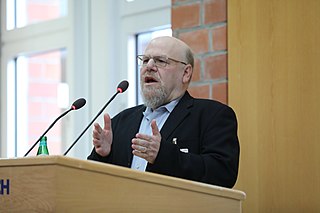
Edward Albert "Ed" Feigenbaum is a computer scientist working in the field of artificial intelligence, and joint winner of the 1994 ACM Turing Award. He is often called the "father of expert systems."

James Alexander Hendler is an artificial intelligence researcher at Rensselaer Polytechnic Institute, United States, and one of the originators of the Semantic Web.
Vasant G. Honavar is an Indian born American computer scientist, and artificial intelligence, machine learning, big data, data science, causality, knowledge representation, bioinformatics and health informatics researcher and educator.

Timothy Wilking Finin is the Willard and Lillian Hackerman Chair in Engineering and is a Professor of Computer Science and Electrical Engineering at the University of Maryland, Baltimore County (UMBC). His research has focused on the applications of artificial intelligence to problems in information systems and has included contributions to natural language processing, expert systems, the theory and applications of multiagent systems, the semantic web, and mobile computing.
Knowledge retrieval seeks to return information in a structured form, consistent with human cognitive processes as opposed to simple lists of data items. It draws on a range of fields including epistemology, cognitive psychology, cognitive neuroscience, logic and inference, machine learning and knowledge discovery, linguistics, and information technology.

Jeffrey M. Bradshaw is a Senior Research Scientist at the Florida Institute for Human and Machine Cognition (IHMC), where he led the research group developing the KAoS policy and domain services framework for distributed systems management and coordination of human-agent-robot teamwork. He also co-leads the development of the Luna Agent Framework and the Sol Cyber Framework. Bradshaw chairs the Scientific Advisory Council for the Nissan Research Center Silicon Valley (NRC-SV), which has the development of autonomous vehicles as a major focus. He and his wife, Kathleen, began a two-year leave of absence from IHMC beginning July 2016 to serve a church mission in the Democratic Republic of Congo, Kinshasa Mission of The Church of Jesus Christ of Latter-day Saints, and began another six months to serve in the new Kinshasa Democratic Republic of the Congo Temple.

The firefighting threat assessment matrix is a risk assessment methodology used by German firefighters and aid organizations in order to identify the risks at the action scene. It has a form of a table with threats as columns and vulnerabilities as rows. The proposed here terms Threats and Vulnerabilities come from the field of risk management. The filled table helps the commander to prepare the strategy for handling the situation. Since the table is just virtual, in commander's head only, there is an underlying mnemonic scheme for naming the threats in German language (4A-1C-4E-Rule). For each vulnerability each likely threat is checked, not just the most likely/important one.
Henry A. Kautz is a computer scientist, Founding Director of Institute for Data Science and Professor at University of Rochester. He is interested in knowledge representation, artificial intelligence, data science and pervasive computing.
A career-oriented social networking site (CSNS) is a social networking site which primary purpose is career-oriented. Tradewind Recruitment hold a summer fete to help students and potential recruiters socialize, this event is setup on social media sites to get maximum reach.
The ACM/IEEE 'International Conference on Human-Robot Interaction' (HRI) is an annual conference "focusing on human-robot interaction with roots in robotics, psychology, cognitive science, human computer interaction (HCI), human factors, artificial intelligence, organizational behavior, anthropology, and other fields". The conference is a joint undertaking of the Association of Computing Machinery (ACM) and the Institute of Electrical and Electronics Engineers (IEEE) organizations.

Michael John Wooldridge is a professor of computer science at the University of Oxford. His main research interests is in multi-agent systems, and in particular, in the computational aspects of rational action in systems composed of multiple self-interested agents. His work is characterised by the use of techniques from computational logic, game theory, and social choice theory.
Boi Faltings is a Swiss professor of artificial intelligence at École Polytechnique Fédérale de Lausanne.






